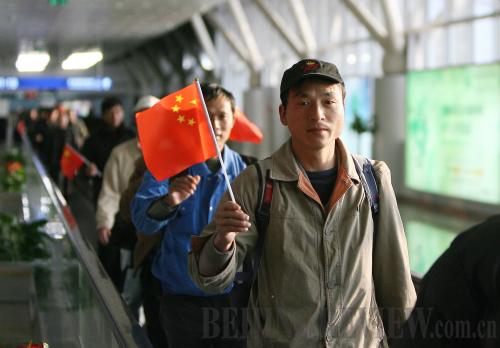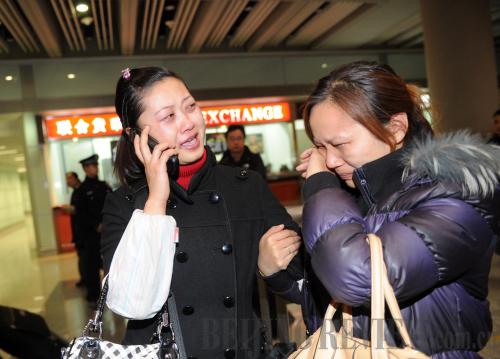Out of Libya
 |
|
HOMECOMING: Chinese evacuees from Libya arrive at the Beijing Capital International Airport on February 27 [Wang Jianhua] |
Since most Chinese enterprises in Libya were involved in infrastructure construction projects, their employees lived in vast areas with no power supply and poor telecommunications. The fact that about 95 percent of Libya is desert or semi-arid areas added to the difficulties of the evacuation.
International affairs commentator Hong Lin, however, listed several advantages. For example, Libya lies across the Mediterranean Sea from Greece, Italy and Spain, all of which have large shipping fleets, with vessels available for China to charter. Since China currently has no direct flights to Libya, and it would be difficult to set up temporary routes, chartered foreign ships played a significant role during this evacuation.
Chinese enterprises operating in Libya are mostly large enterprises such as the China State Construction Engineering Corp., the China Railway Group Ltd. and PetroChina Co. Ltd. These companies have ample overseas working experience and good management, which all helped in organizing the evacuation, Hong said.
Gao Zugui, Director of the Institute of World Political Studies at the China Institutes of Contemporary International Relations (CICIR), noted this evacuation was a test of China's evacuation mechanism. China's last major evacuation was during the recent turmoil in Egypt, when China pulled out some 1,800 citizens.
During the evacuation from Libya, the Chinese Government evacuated nationals via air, sea and land routes.
 |
|
BON VOYAGE: China's Ambassador to Turkey Gong Xiaosheng (left) supervises the evacuation operations at Istanbul's airport. On the night of March 1, a total of 982 evacuees from Libya left the airport to return to China on five planes [Chen Ming] |
On February 23, the Civil Aviation Administration of China (CAAC) sent its first chartered plane to Libya's capital Tripoli to return evacuees to China. Since most evacuees had been transferred to third countries, such as Egypt, Greece, Malta, Tunisia, Jordan, Sudan and Turkey, CAAC dispatched flights to aid the evacuation.
Beginning March 1, CAAC dispatched 20 flights every day. Among these, Air China and China Southern Airlines both sent six flights a day. China Eastern Airlines and Hainan Airlines sent five and three flights, respectively.
 |
|
SAFE ARRIVAL: Tang Fang (left), an evacuee from Libya, calls her family after arriving in Beijing on a charter plane on February 25 [Yu Yang] |
China's Air Force also dispatched four cargo planes to Libya to get evacuees to Sudan's capital Khartoum. In addition, China's Foreign Ministry chartered planes from other countries to aid the withdrawal.
Most Chinese nationals were evacuated from Libya by ship, however. After coordinating with the Chinese Embassy in Greece, Greece sent seven chartered vessels to Benghazi. Evacuees were then transferred to Crete before they headed for China. Each Greek vessel transferred about 2,000 people each voyage. Malta also sent chartered vessels to transport Chinese citizens to its port city of Valletta.
 |
|
JOY OF THE JOURNEY: Passengers watch movies on a laptop aboard the Greek vessel Hellenic Spirit on February 26. More than 4,200 Chinese, Vietnamese and Bangladeshi nationals were evacuated that day from Libya on two Greek vessels chartered by the Chinese Government [Yu Yang] |
The China Ocean Shipping (Group) Co. and the China Shipping (Group) Co. directed their ships in nearby waters to participate in the evacuation as well. In addition, the Chinese Navy sent a frigate from its anti-piracy escort fleet in the Gulf of Aden to protect the vessels.
Chinese evacuees also took overland routes to escape Libya, by traveling to Tubruq, near the Libya-Egypt border. Then they entered Egypt through the Egyptian city of Salum. The first group of 83 Chinese escaped Libya this way. The Chinese Embassy in Egypt organized more than 100 buses to wait in Salum to transport possible evacuees.
In the mean time, the Chinese Ministry of Transport issued an emergency notice calling on all transportation departments at home to cooperate with CAAC, to offer efficient service to the evacuees when they returned to China.
 0
0 







Go to Forum >>0 Comments